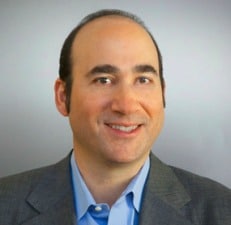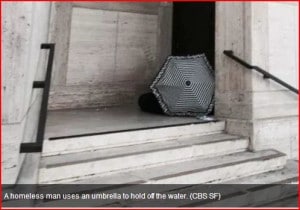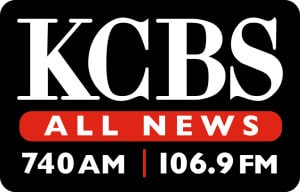
There are still radio stations out there creating compelling, important, award-winning, original local news content. KCBS in San Francisco is certainly one of them, and behind the hard work of reporter Doug Sovern (pictured here), the station recently uncovered a big story in San Francisco and, in reporting it to its listeners, put radio’s specialty, theatre-of-the-mind, on display. Both Sovern and then-Director of News and Programming, Ed Cavagnaro, will receive an award for the series. The National Society of Professional Journalists will give them its Sigma Delta Chi Award for Best Investigative Reporting in Radio.
Unholy Water, a five-part series, exposed the San Francisco Archdiocese’s installation of an illegal plumbing system at St. Mary’s Cathedral, to pour water on homeless people at night to keep them from sleeping in the cathedral doorways, in the middle of the worst drought in California history. We spoke to Sovern in detail about the series and how it feels to be able to produce this kind of compelling radio.
Why did you decide to do this series?
SOVERN: We have been covering San Francisco’s intractable homeless problem for many years. Last winter, my then-News Director, Ed Cavagnaro, got a tip from a listener, wondering why the pavement was wet around St. Mary’s Cathedral in San Francisco every night, when, at that point, it hadn’t rained for months. He wondered whether it might have something to do with the homeless who sleep there at night. The tipster walked his dog by the cathedral every night, and suspected water was being poured on the homeless on purpose. Ed came to me and asked me if I thought it was worth investigating. I told him you bet I did, and took it from there.
How hard was it to get people you interviewed to cooperate?
SOVERN: Extremely. I spent the night outside the cathedral and discovered that, yes indeed, the Archdiocese had installed a rooftop plumbing system that poured water down on the homeless who slept in the church alcoves. I documented how often the showers came on, and for how long. I tried to interview as many of the homeless there as possible. Some were forthcoming, others weren’t. Then I researched city building records to see if the system was legal (it wasn’t; there were no permits, it was installed in violation of city codes). City officials investigated when I told them what I’d found. The Archdiocese folks responded to my inquiries, but at first, professed ignorance, then insisted the system was installed for other reasons and there wasn’t anything wrong with it. After our first report, the Bishop running the cathedral confessed, although he defended his actions. The Archbishop refused to speak with me and never responded to our inquiries about whether he knew about it as well.
in violation of city codes). City officials investigated when I told them what I’d found. The Archdiocese folks responded to my inquiries, but at first, professed ignorance, then insisted the system was installed for other reasons and there wasn’t anything wrong with it. After our first report, the Bishop running the cathedral confessed, although he defended his actions. The Archbishop refused to speak with me and never responded to our inquiries about whether he knew about it as well.
What was the end result of what you uncovered?
SOVERN: San Francisco building officials made the Archdiocese rip out the system. The water was shut off. The Bishop apologized publicly, and was later transferred to a suburban parish. The Mayor and other city officials chastised the Archdiocese for what it had done (and so did the Governor) and engaged them in a new initiative to help the homeless. Church leaders worked with the Interfaith Council to create new programs to help the homeless, instead of drenching them while they slept.
What was the reaction from listeners?
SOVERN: Very positive. We got hundreds of comments on our website, on Facebook, Twitter, you name it. People were shocked to learn what was happening, and pleased that we had exposed it and put an end to it. The story was picked up nationally, even internationally, and reported everywhere from the LA Times to the Washington Post to the BBC to Al Jazeera.
This kind of long-form reporting is rare for radio these days. Why was it important for you to do this?
SOVERN: I know that very few commercial stations still pursue this kind of reporting,  but it’s been a hallmark of KCBS, and I hope we never give it up! I have been blessed to have a wonderful, supportive News Director in Ed Cavagnaro (now retired), who not only came to me with great ideas over the years, but trusted me to turn them into compelling radio, while also allowing me to run with some of my own, because he has seen that they invariably produce powerful results. We have done long-form documentaries over the years about homelessness in San Francisco, about life for homeless schoolkids, about life for underprivileged kids in the most dangerous parts of the city, about drug abuse, crime, the high cost of housing, you name it. We’ve also done investigative series on workers compensation abuse by city employees, about traffic and pedestrian safety issues, and many more. I went to East Africa to do a documentary on AIDS. I did one in North Africa about the status of women after the Arab Spring. I’ve reported on environmental catastrophe in China, and earthquake survivors in Haiti. I realize this kind of reporting is normally left to national newspapers or public radio networks or 60 Minutes, but the response from our listeners is always so incredibly positive, and this kind of enterprising work stands out so starkly against the landscape of most commercial radio, that it’s been tremendously rewarding for us. We have a sacred trust from the public, and a powerful platform with which to fulfill that trust. We can’t surrender to the economic pressures constraining our business and forget why we are here in the first place. Now I am lucky to have another extremely supportive boss, Jack Swanson, who trusts me implicitly. It’s like Steve Young succeeding Joe Montana for the 49ers, or Aaron Rodgers following Brett Favre for my beloved Packers. We got back-to-back Hall of Famers!
but it’s been a hallmark of KCBS, and I hope we never give it up! I have been blessed to have a wonderful, supportive News Director in Ed Cavagnaro (now retired), who not only came to me with great ideas over the years, but trusted me to turn them into compelling radio, while also allowing me to run with some of my own, because he has seen that they invariably produce powerful results. We have done long-form documentaries over the years about homelessness in San Francisco, about life for homeless schoolkids, about life for underprivileged kids in the most dangerous parts of the city, about drug abuse, crime, the high cost of housing, you name it. We’ve also done investigative series on workers compensation abuse by city employees, about traffic and pedestrian safety issues, and many more. I went to East Africa to do a documentary on AIDS. I did one in North Africa about the status of women after the Arab Spring. I’ve reported on environmental catastrophe in China, and earthquake survivors in Haiti. I realize this kind of reporting is normally left to national newspapers or public radio networks or 60 Minutes, but the response from our listeners is always so incredibly positive, and this kind of enterprising work stands out so starkly against the landscape of most commercial radio, that it’s been tremendously rewarding for us. We have a sacred trust from the public, and a powerful platform with which to fulfill that trust. We can’t surrender to the economic pressures constraining our business and forget why we are here in the first place. Now I am lucky to have another extremely supportive boss, Jack Swanson, who trusts me implicitly. It’s like Steve Young succeeding Joe Montana for the 49ers, or Aaron Rodgers following Brett Favre for my beloved Packers. We got back-to-back Hall of Famers!
How great is it to be able to work the details out on a story like this, have it air, and turn out so meaningful?
SOVERN: It is so fulfilling and rewarding. I still get that adrenaline rush when a story comes together and I realize I’m on to something big, or even something small that I know is going to resonate and hit home with our listeners. I love a great story. If that ever goes away, I’ll know it’s time to quit. But the most important part of this story was that when confronted with the truth, the Archdiocese did the right thing. They turned off the water and have been trying to help those homeless. We were able to shine the spotlight on wrongdoing and get it stopped. That is always the best reward of all.
KCBS was the only commercial radio station in the country to win a Sigma Delta Chi award this year. The honor will be recognized during a ceremony at the National Press Club in Washington, D.C., on June 20.
Listen to the series HERE.
Congratulate Doug on a job well done at [email protected]






